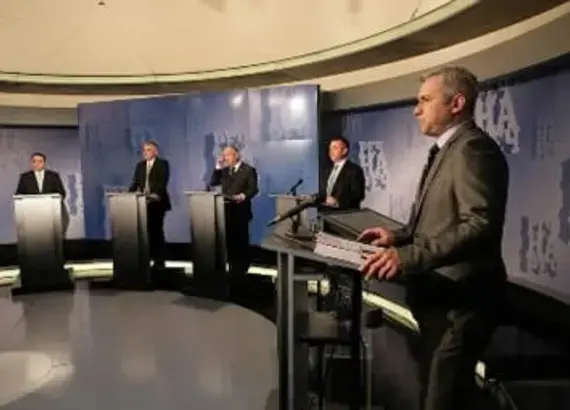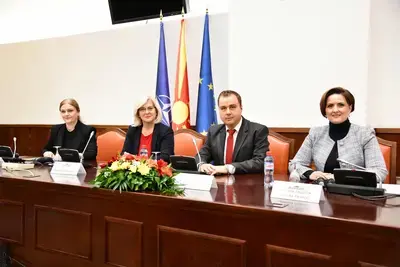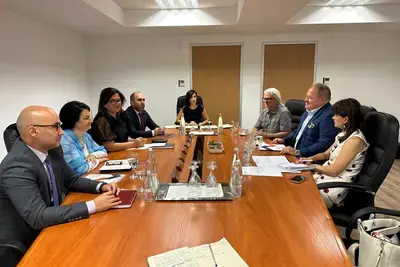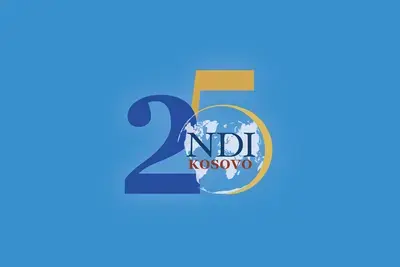
Success Story
'Rec na Rec:' Serbian Debates Connect People with Politicians
Serbian politics in the past decade have been characterized largely as a contest between pro-western democrats and revisionist nationalists, as the country sought to remake itself as a stable democracy after the disastrous rule of Slobodan Milosevic ended in 2000. The 2008 victory of pro-European Boris Tadic and his Democratic Party (DS) heralded a repudiation of the Milosevic era and opened a path toward eventual membership in the European Union (EU). But ensuing economic woes, a complicated democratic reform agenda, consternation around Kosovo’s independence from Serbia, and a new center-right option in the pro-EU Serbian Progressive Party (SNS) conspired against the government in general elections this past May.
Voters came to the election seeking change and change they made, handing power to SNS leader Tomislav Nikolic, who bested Tadic in their presidential run-off. Ivica Dacic, who succeeded Milosevic as leader of the Serbian Socialist Party, is to serve as the country’s new prime minister.
As the country’s eight million citizens geared up for the elections, polling conducted by the International Republican Institute (IRI) revealed their disenchantment with the political process and desire for substantive public dialogue about economic and social reform in such areas as job creation and health care. To help address this need, Serbia’s Center for Free Elections and Democracy (CeSID) and Radio Televizija Srbija (RTS), in partnership with NDI, sought to break new ground with a series of nationally televised debates, called Rec na Rec (Word on Word), to connect voters with candidates. Support came from the U.S. Agency for International Development.
From the Debates
During the presidential run-off debate, Tadic sought to provide rationale for the actions his party (DS) has taken and what they would do should he be re-elected. Tadic offered his thoughts on the economy - a major issue in the election - including his plan to reach out to foreign companies to bolster investment in Serbia: "Without big investments we cannot solve unemployment. That is why foreign policy is important for the economy." Nikolic, on the other hand, took the opportunity to point out some flaws in the DS-led government, saying: "I would like to hear if it is really on the agenda of DS to combat corruption and to change the public procurement act."
The debates gave parties and candidates the opportunity to present clear policy positions and presented voters with information they could use to hold office holders accountable after the election. The U.S. Commission on Presidential Debates, which has worked with NDI on debate programs around the world since 1987, provided technical assistance with debate rules, format and production.
Modeled on the U.S. presidential debates, the Serbian series provided a constructive environment for political dialogue in an electoral process that is often marred by name-calling, shouting and little mutual respect among candidates. For three consecutive Thursday nights in April and May, representatives of the seven political party groupings in the National Assembly presented their platforms and policies in three, prime time debates. The debates captured an average 42 percent share of the television audience, some 1.7 million viewers. For the presidential runoff debate between Nikolic and Tadic, nearly 50 percent of the Serbian TV audience – approximately 2.5 million viewers – tuned in.
In advance of those debates, which originated in the RTS Belgrade studio without a live audience, the political parties agreed on the issues to be discussed, and the theme of each debate was tailored to citizen concerns as determined by the IRI poll. The final topics were social issues, including health care; the economy, unemployment and the national debt; and Serbia’s foreign policy, including the politically-charged issue of Kosovo independence and EU integration. At times, the debates resembled a joint press conference. There were several charged moments as candidates exchanged views on corruption and the economic outlook for the young people of Serbia.
In addition, there were 15 local debates held throughout the country hosted by the Center for Research, Transparency and Accountability, an NDI grantee. Conducted in theaters, auditoriums, municipal council chambers and youth centers, these debates allowed citizens to pose questions directly to party representatives. Among the topics were economic development, reducing unemployment, environmental protection, health care reform and youth policy. A recurring theme was the lack of transparency in local budgeting and the need for more safeguards against the misuse of public funds.
In a poll conducted by the Serbian media company B92 and Ipsos Strategic Marketing after the presidential debate, 12.5 percent of viewers said they changed their minds about which candidate to support after watching the debate. The sample size was 1,002 respondents.
Looking to the future, Rec na Rec is becoming a permanent part of Serbia’s political landscape with assistance from CeSID, which received NDI training in organizing and staging debates, and RTS, which has agreed to promote and televise debates for future elections.
Related:
Published August 6, 2012. Updated August 7, 2012.



